Published Apr 03, 2025 | 11:35 AM ⚊ Updated Apr 12, 2025 | 11:35 AM
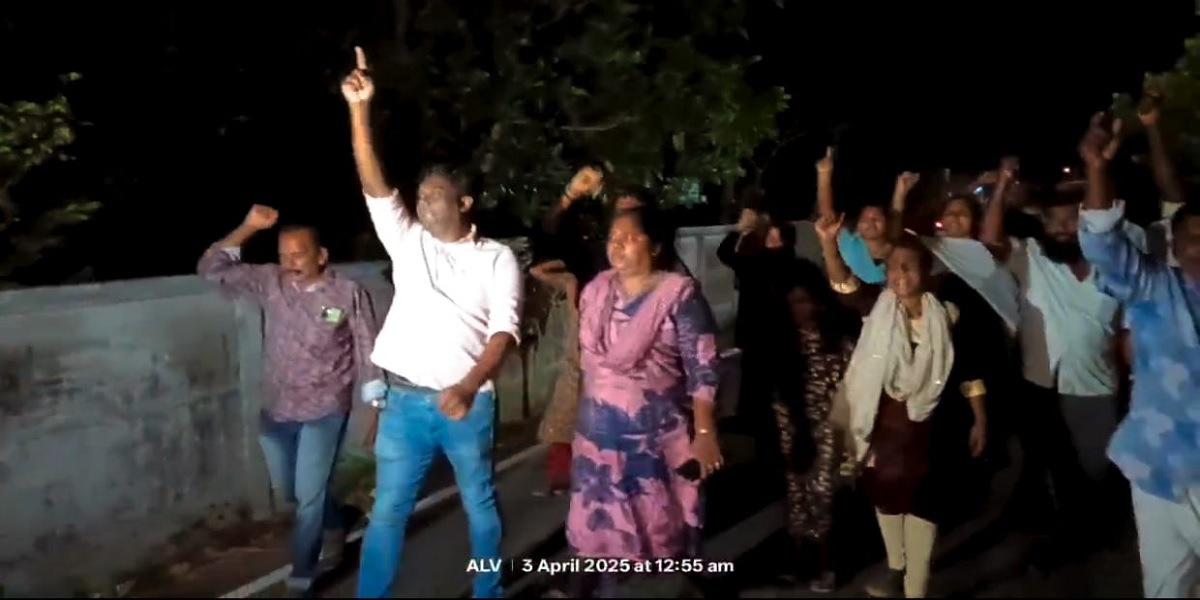
A celebratory rally at Munambam after the Lok Sabha had passed the Waqf (Amendment) Bill.
Synopsis: The Lok Sabha’s adoption of the Waqf (Amendment) Bill sparked a night of celebrations at Munambam, a Kochi suburb. More than 600 families have been protesting the Kerala Waqf Board’s claim on their land holdings. The celebrations, however, left the non-BJP parties, especially the pro-Christian ones, in the state worried.
Munambam, a Kochi suburb in Kerala, stayed awake on Wednesday, 2 April, night as the Lok Sabha debated the revised version of the Waqf (Amendment) Bill, 2024, tabled as the Unified Waqf Management Empowerment, Efficiency and Development (UMEED) Bill.
At stake were the holdings of more than 600 families that had purchased parcels of land from the Farook College at Feroke in Kozhikode.
Their hopes were pinned on Section 2A of the Bill, which frees trusts — Farook College in Munambam’s case — from the ambit of the Waqf Act.
Slogans, Bolo, Bharat Mata Ki Jai, followed by Jai Modi ji, Jai Amit Shah ji, Jai Suresh Gopi ji, and Jai Rajeev Chandrasekhar ji, reverberated in the night sky around 1 am on Thursday, 3 April. This was soon after the Lok Sabha had passed the Bill with 288 members voting in favour and 232 against it after a 12-hour debate.
It was one moment of extreme hope the residents have been waiting for ever since the Kerala Waqf Board demanded their holdings back, saying they belonged to the board.
Siddique Sait, the original owner, had gifted the property to Farook College through a Waqf deed in 1950 for educational and charitable purposes. The college sold the land in the 1960s.
The euphoric pre-dawn slogans at Munambam that reverberated across Kerala, perhaps, was the loudest the BJP had received from a community comprising followers of different religions.
Three months ago, the situation was different. A crib set up as part of Christmas celebrations at the Government Boys School in Palakkad’s Thathamangalam was vandalised. Three members of the Vishwa Hindu Parishad and Bajrang Dal were arrested earlier for disrupting Christmas celebrations.
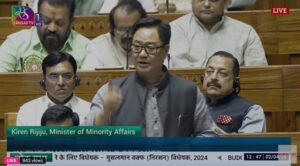
Minister for Parliamentary Affairs Kiren Rijiju speaking on the Waqf (Amendment) Bill in the Lok Sabha on Wednesday, 2 April.
These instances left Christians angry. However, such “aberrations” did not deter Church bodies like the Catholic Bishops Council from throwing their weight behind the Munambam protesters.
The BJP, specifically Prime Minister Narendra Modi, has been consistently and visibly backing the Christian community in Kerala. Even the attack on churches in Manipur did not spark a strong protest in the state but some ripples.
After the Parliamentary Affairs Minister, Kiren Rijiju, had tabled the Bill in Lok Sabha, the protesters placed a statue of Koratti Muthi (St Mary) at the protest site. Significantly, the statue was a present from Union Minister of State Suresh Gopi, the lone BJP Lok Sabha member from Kerala.
Siji Ayil, a Munambam leader, told South First that Gopi had requested them to place the statue at the protest venue. She added that the minister would visit the centuries-old Koratti Muthi (St Mary’s Forane) Church — around 15 kilometres from the Cochin International Airport — in Thrissur after the Waqf (Amendment) Bill becomes an Act.
This unexpected wave of pro-BJP sentiment among Kerala’s Christian community has sent a strong message to the ruling LDF and Opposition UDF, particularly to the seven Christian MPs from the state.
Among them, Hibi Eden (Ernakulam), Benny Behanan (Chalakudy), Dean Kuriakose (Idukki), and Anto Antony (Pathanamthitta), face growing pressure from their electorate.
CPI (M)’s Rajya Sabha MP John Brittas is also under scrutiny, but the most affected are Kerala Congress leaders Jose K Mani (Rajya Sabha MP from the Kerala Congress Mani faction) and K Francis George (Kottayam MP from the Joseph faction).
Even as the Lok Sabha debated the Bill, both factions of the Kerala Congress went into separate huddles by 10 pm, indicating the gravity of the situation. The Joseph faction’s meeting lasted until midnight.
The developments at Munambam have signalled a potential shift in the state’s Christian political landscape, posing new challenges for Kerala’s traditional political fronts.
A sense of betrayal was evident among the Munambam protesters.
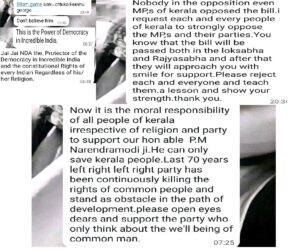
Angry messages flooded the Munambam protesters’ WhatsApp groups.
When South First approached Joseph Benny, a leader from the Munambam protest, he remarked,
“Jose K Mani informed us that he would express discontent in Rajya Sabha over the Waqf Board’s supreme authority in decision-making. It was a promise he made to us, so he couldn’t break it,” another Munambam leader Joseph Benny told South First.
“But Francis George, MP, didn’t inform us of anything on this issue. Two days ago, he said he needed to study the matter thoroughly. But today, you all saw what he did in Parliament,” he added.
George’s turn to speak in Parliament came around 10:30 pm. He dismissed claims that the Waqf (Amendment) Bill could help resolve the ongoing Munambam Waqf dispute.
“The Munambam dispute can be resolved by making the ambiguous provisions of the Act unambiguous, and this can be done without affecting the fundamental rights of Muslims,” he said.
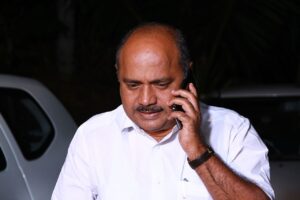
K Francis George, MP (Rahul Payyappilly Palakkappilly/Wikimedia Commons).
Munambam residents were waiting for Mani’s stance in the Rajya Sabha on Thursday. The WhatsApp groups of protesters were flooded with anger towards Kerala’s Christian MPs.
“Everything is a game. Don’t trust him (George),” Babu, a resident, posted.
“Nobody in the Opposition, not even Kerala MPs, opposed the Bill. I urge every Keralite to strongly oppose these MPs and their parties,” another resident, Koshy George, wrote.
“You know the Bill will pass in both Lok Sabha and Rajya Sabha, and after that, they will approach you with a smile for support. Please reject them all and teach them a lesson. Show your strength,” he urged.
Despite their disappointment with Kerala MPs’ stand on the issue, Munambam residents celebrated the Bill’s passage, bursting crackers, distributing sweets, and holding a small rally around 12:45 am. They felt like winners.
Apu John Joseph, son of Kerala Congress (Joseph) chairman PJ Joseph and the party’s state coordinator, dismissed the BJP’s efforts to stir controversy over the Waqf (Amendment) Bill, asserting that such tactics would have no impact on the 2026 Assembly elections.
“What our MP, Francis George, said in Parliament yesterday reflects our official position. We support certain amendments, such as modifying the legal obligation for landowners to prove claims before the Waqf Board, ensuring a more practical approach,” John Joseph told South First.
“However, only the state government can truly resolve the issue, and this Bill does nothing to help the people of Munambam,” he added.
John Joseph further stated that his party was opposed to amendments like allowing non-Muslim participation in Waqf matters, as it would hurt religious sentiments.
“Justice must be served without alienating our Muslim brothers,” he said.
When asked if the controversy could affect Kerala Congress electoral prospects, particularly given its strong Christian voter base, John Joseph acknowledged potential short-term consequences.
“It might have some impact in local body elections, but not in the Assembly polls. The BJP’s real aim is to split the UDF’s minority vote, but this will only benefit our common opponent, the LDF,” he opined.
“In local bodies, the LDF often has an upper hand, but people will see through the BJP’s tactics. They don’t want the LDF back in power, and that realisation will influence the Assembly elections which will finally benefit the UDF,” he sounded confident.
John Joseph also criticised the BJP’s selective outrage, pointing out an attack on Christian pilgrims in Jabalpur by extremist Hindu groups, a day before the Waqf Bill was tabled.
“The Catholic Bishops’ Conference of India (CBCI) condemned the incident on 1 April, yet many BJP supporters in Kerala are unaware of such developments in North India. Those now aligning with the BJP must recognise the broader political reality,” he said.
John Joseph praised the stance of Samajwadi Party MP Iqra Choudhary. Participating in the debate, the MP from Kairana in Uttar Pradesh said the Waqf Bill was aimed at not benefitting the Muslims but to erase their identity.

Samajwadi Party’s Iqra Choudhary.
Her hard-hitting speech was one of the notable ones in the Lok Sabha.
Meanwhile, Kaduthuruthy MLA Mons Joseph, a senior Kerala Congress (Joseph) leader, confirmed that the party held midnight discussions on how to approach the Waqf issue.
Party leader Jais John Vettiyar also acknowledged these deliberations.
However, a senior leader, speaking to South First, admitted that some confusion persisted.
“Certain Christian religious leaders have expressed concerns, and we must handle the situation carefully. We will soon engage in discussions with them to expose the BJP’s divisive politics,” he said.
A Kerala Congress (Mani) faction leader told South First that it remained uncertain whether the Bill would resolve the Munambam issues.
Leaders confirmed late-night meetings were held at party offices.
“Jose K. Mani, MP, will clarify our stance on the Bill in the Rajya Sabha today. Just wait a few more hours,” the leader added.
During the discussion, Congress MP Hibi Eden strongly opposed the legislation, calling it unconstitutional and anti-minority.
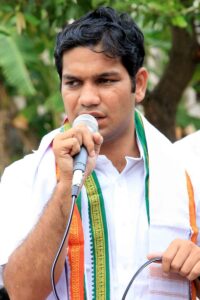
Hibi Eden, MP, of the Congress. (Wikimedia Commons)
A devout member of the Latin Catholic community, Eden emphasised his roots in the fishing community, just like the people of Munambam, which falls under his constituency, Ernakulam.
He accused the BJP of using Munambam as a political tool rather than genuinely addressing concerns over land ownership. He argued that the Bill lacked clear provisions for restoring land rights and questioned the BJP’s motives, alleging an attempt being made to create divisions between Christians and Muslims in Kerala.
Eden also challenged the BJP to reinstate the Anglo-Indian reservation, highlighting its pattern of discrimination against Christians through attacks on institutions, restrictions on charity funds, and anti-conversion laws in Karnataka.
He criticised the BJP government’s newfound “affection” for the Christian community, questioning why it remained silent when Christians faced persecution in Manipur, despite appeals from the CBCI and Kerala Catholic Bishops’ Conference.
(Edited by Majnu Babu).

